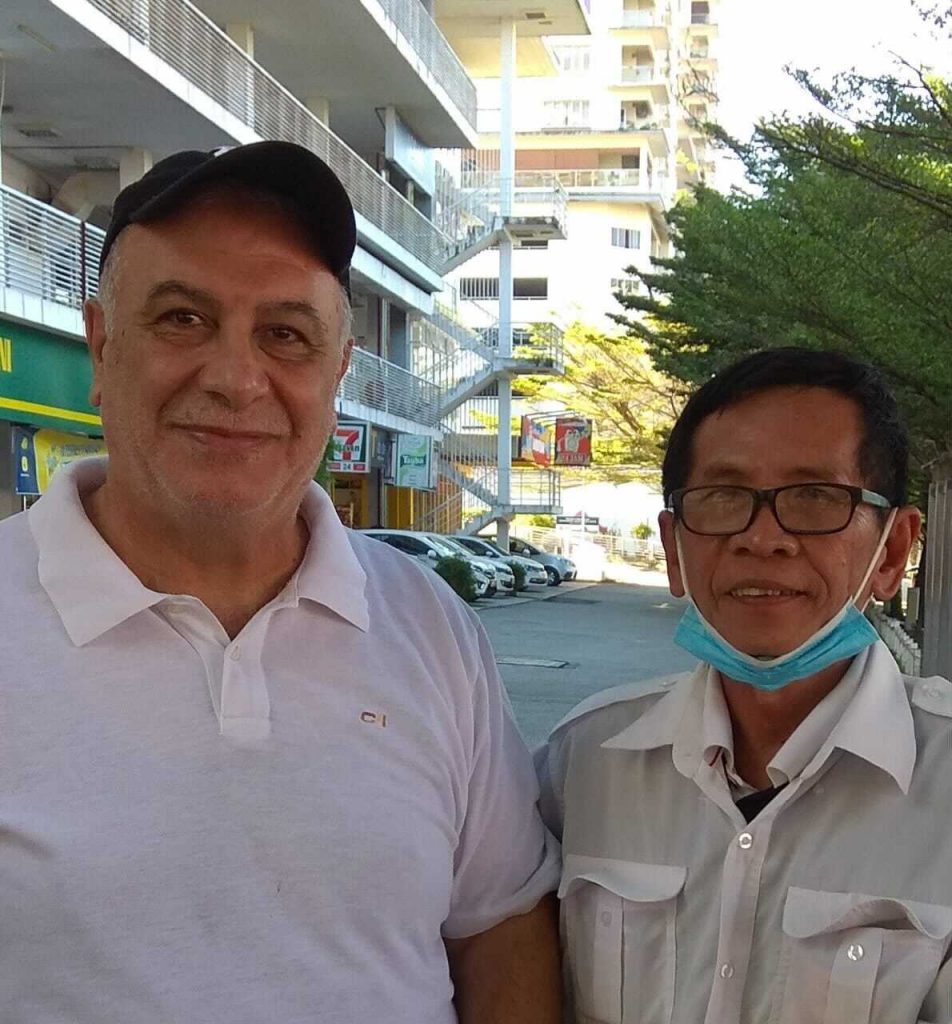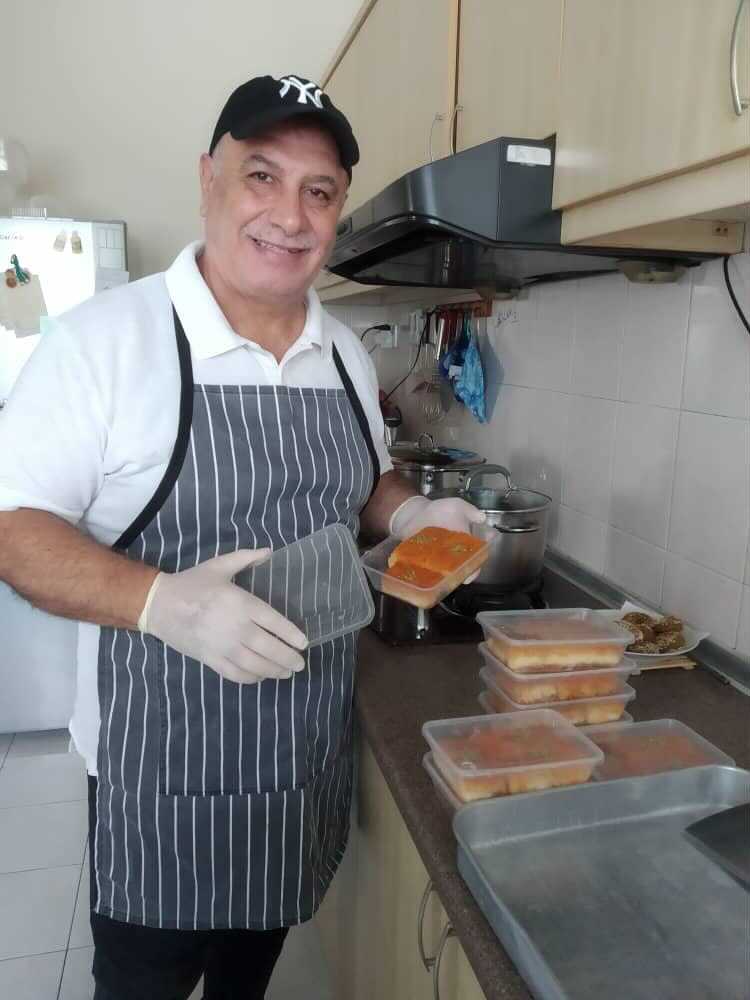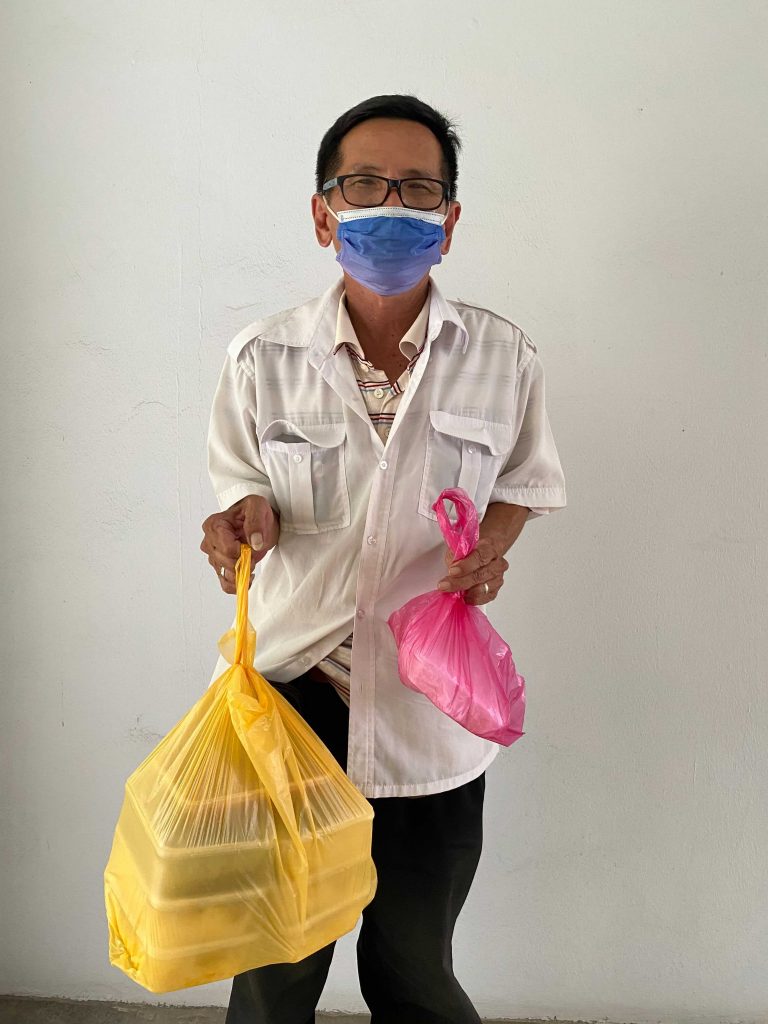Written by Sharonne Broadhead, Interviewed by Khaulah Fadzil
Abo Loay and Ng may seem like an unlikely pairing, a Palestinian-Syrian refugee chef and a Chinese Malaysian taxi driver, but when you see them together, it is clear why they make such a great team.
“He is my brother, I have a Chinese brother, why not?” Abo Loay says with a big warm laugh. Silver-haired and brimming with energy, Abo Loay is very sociable, always making time for a quick chat. In fact, his wife says she won’t follow Abo Loay because he talks to too many people. Abo Loay definitely has charisma, he also has the skills of a highly trained and experienced chef. Abo Loay trained with a professional chef in Damascus when he was 20 years old.
“He is my brother, I have a Chinese brother, why not?”
“I learnt everything about cooking from him—I learnt about spices, why must [we] add half a spoon, why not a full spoon, why must we add 15 to 20 spices. Because you must know why you add this spice and how much, if you change a bit, the taste is very different, the colour is different—it is very important for me to cook like this. You know many people cook but they don’t know why, but you see with cooking you must understand [with] small changes you make, you change the whole dish. After I learnt from him, I opened my own restaurant.”
Abo Loay’s restaurant was successful, but when the war in Syria began in 2011, he had to leave it all behind, his restaurant, his house, everything. Abo Loay with his wife and kids fled for safety and found a safer home in Malaysia in 2012. Almost immediately, Abo Loay opened a restaurant in Kuala Lumpur to continue his love of cooking and to support his family, but it was closed when the owner of the building decided to sell the space. Abo Loay then started a small cafe at an apartment, commuting daily on the train; but, it did not make enough money to stay open. Undiscouraged by these setbacks, Abo Loay rented a kitchen in his building, but it ended up closing too;
“At the start of the pandemic the owner needed to sell the shop, other shops also closed. So now, I cook from my kitchen. I get orders from several restaurants and customers.”
Abo Loay’s customers are loyal and this is where Ng comes in.
Uncle Ng Chin Kai is a 64 year old man who drives a red taxi and speaks of his children with pride. He has raised three daughters and a son; and proudly shares that two of his daughters are currently working in Japan. Ng used to wait for customers in his taxi near Abo Loay’s house. Abo Loay would always say “Hello” on his way to the shops and remembers the first day that he took a ride with Ng, “I used to see him at the taxi stand and one day I asked him to take me to go to the market. I like him, he is a very good man, a very honest man, does not complain. Before I used to ask other drivers to help me deliver my food but many people complain, it’s too far or they charge me so much, but Anjee is not like that.”
Wait a minute, Anjee? Who is Anjee?
Ng laughs, “I told him my name is Ng but I think he cannot say “Ng”, maybe in Arabic there is no Ng so he calls me Anjee because it is spelt N and G. I don’t mind it, now his customers also call me Anjee.”
Abu’s loyal customers know Ng well as he delivers many of the regular food orders. With great appreciation Abo Loay says, “He helps me deliver food three to four, sometimes five times a week. Sometimes I need to get something – I show him a picture and he will get it for me. We work very well together, he knows the markets I need to go to, where I can get my items to cook, he likes to help me and I also trust him to deliver my food and be good to my customers too. He knows my customers, he remembers their houses, and he never charges me so much. He also takes care of the food when he delivers it. He is a very honest person.”
Ng also benefits greatly from the partnership, the pandemic has drastically reduced the number of people needing taxi service, so Ng is happy for the extra business. “Sometimes we go to the market and then he wants to go many places after, deliver this and that. Now I am not driving so much…. so I am happy I get to have some income by delivering his food to restaurants and customers’ houses too.”
Ng and Abo Loay have a great partnership which has benefited both of them during these difficult times and will continue on, unless Abo Loay and his family can one day resettle in another country. They would love to go to the United States (USA), where they have relatives. Abo Loay wishes for a permanent home with security and a future for his children. Life in Malaysia for Abo Loay and other refugees is difficult. Malaysia has not signed the 1951 Refugees Convention (the international agreement that requires countries to protect refugees) and it does not have any laws recognizing refugees. This means that refugees have no legal rights here in Malaysia – they are treated as illegal immigrants. This makes it difficult for them to rent homes, send their children to school, and work to earn livelihoods to support themselves and their families. Ng points out that sometimes Abo Loay is stopped by police and he has to show his passport and refugee card. Refugees are always at risk of being arrested and detained. They can be taken to court and punished for immigration offences. This brings great stress and insecurity to Abo Loay and his family, and all refugees who are in Malaysia.
Abo Loay and Ng don’t talk about these things and rather try to enjoy life as much as they can. Good company and good food. When Abo Loay is asked if Ng enjoys the food that he makes, Abo Loay laughs, “Of course! But he said he doesn’t like it too sweet. I [tell him] Arab desserts are very sweet, sometimes I give him very sweet desserts and he will scold me, saying ‘it’s too sweet’ I still give.”
—
If you would like to order food from Abo Loay, contact him at 019 304 6915.



